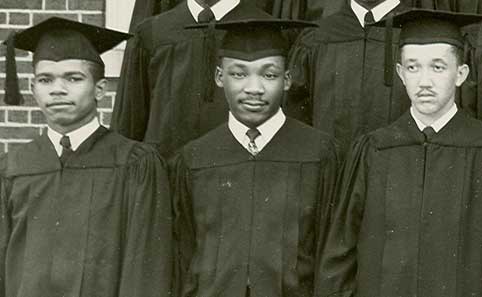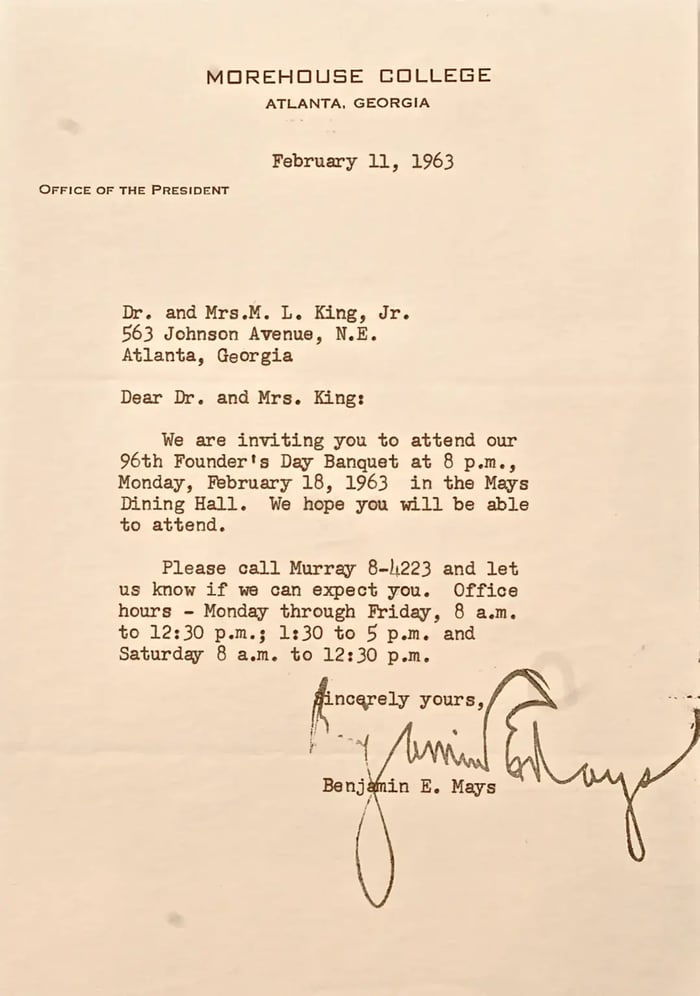- About
- Academics
- Admissions & Aid
- Life
- Research
- News & Events

Home
> Academics
> Centers & institutes
> Martin luther king jr collection
> King at morehouse
King at Morehouse
King at Morehouse
-
Character
Character
As an all black university, Morehouse College was fertile ground for the young Martin Luther King Jr., who entered the college as an early-admission student in 1944 at the age of 15. It was on the grounds of the only college in the world for African American men where he met great social activists, thinkers, theologians, and educators who became mentors.
Dr. Benjamin E. Mays, the Morehouse president who is considered the architect of the college’s reputation for excellence, proved to be an incomparable inspiration to King.
In his weekly chapel address and newspaper columns, Mays urged Morehouse men to be “sensitive to the wrongs, the sufferings and the injustices of society” and to “accept responsibility for correcting these ills.”
Outstanding professors also shaped Martin Luther King Jr. at Morehouse, who would one day be one of the world’s most renowned civil and human rights nonviolent leaders. As a sociology major, King was introduced to the problem of segregation by department chair Dr. Walter P. Chivers. Dr. George D. Kelsey, director of the School of Religion, inspired him to think beyond his early fundamental instruction regarding the Bible and theology.
The influence of these incredible men undoubtedly led King to abandon his pursuit of law and medicine and, instead, enter the ministry.
President Mays introduced him to the Indian social reformer Mahatma Gandhi’s teachings and his method of nonviolent protest. Kelsey, his favorite professor, set an example of what an ideal minister could be, someone who could combine the tradition of religion with the modern world’s issues. Professor Samuel W. Williams exposed him to Henry David Thoreau’s “Essay on Civil Disobedience.” King said he read the essay several times, transfixed by the idea of “refusing to cooperate with an evil system.”
As King finished his final year at Morehouse, it was evident that he had transformed into the leader he was destined to become when he wrote in the student publication, The Maroon Tiger: “We must remember that intelligence is not enough. Intelligence plus character—that is the goal of true education.”
By the time King continued his education at Crozer Theological Seminary and at Boston University’s School of Theology, where he earned a doctorate in systemic theology, he was well attuned to the teachings, principles, and methods of social reform and support that marked his ascent to civil rights icon.
-
Morehouse Legacy

Morehouse Legacy
Martin Luther King Jr. at Morehouse is a member of a long line of King men drawn to the exceptional education steeped with moral development that Morehouse College offers.
- Dr. Adam Daniel Williams, grandfather, class of 1898, Atlanta Baptist College
- Dr. Martin Luther King Sr., father, class of 1930
- The Rev. Dr. Martin Luther King Jr., class of 1948
- The Rev. A.D. Williams King, brother, class of 1960
- Martin Luther King III, son, class of 1979
- Dexter Scott King, son, attended 1979 to 1984
-
King Timeline
King Timeline

1929
Martin Luther King Jr. is born in Atlanta on January 15
1944
Martin Luther King Jr. enters Morehouse as an early-admission student at the age of 15
1948
Martin Luther King Jr. receives the bachelor of arts degree in sociology from Morehouse. He continues his education at the Crozer Theological Seminary, and later at Boston University’s School of Theology
1957
King receives his first ever honorary degree from Morehouse, presented to him by Dr. Benjamin E. Mays, the school’s sixth president
1959
King delivers Commencement address at the College
1960
King teaches a senior philosophy class as a visiting professor
1965
King becomes a trustee at Morehouse and delivers the Convocation address after receiving Nobel Peace Prize
1966
King delivers keynote address in celebration of the College’s 100th anniversary
1968
King’s body is carried from Ebenezer Baptist Church to the Morehouse campus for final funeral service. Dr. Benjamin E. Mays delivers the eulogy
1970
Coretta Scott King is awarded an honorary degree from Morehouse
1978
The Martin Luther King Jr. Chapel, the world’s largest religious memorial to King, is dedicated by Ambassador Andrew Young
1981
The chapel is renamed “The Martin Luther King Jr. International Chapel” in honor of King’s international acclaim as a Nobel Peace Prize winner
1984
The King statue is unveiled on the King Chapel plaza
Character
As an all black university, Morehouse College was fertile ground for the young Martin Luther King Jr., who entered the college as an early-admission student in 1944 at the age of 15. It was on the grounds of the only college in the world for African American men where he met great social activists, thinkers, theologians, and educators who became mentors.
Dr. Benjamin E. Mays, the Morehouse president who is considered the architect of the college’s reputation for excellence, proved to be an incomparable inspiration to King.
In his weekly chapel address and newspaper columns, Mays urged Morehouse men to be “sensitive to the wrongs, the sufferings and the injustices of society” and to “accept responsibility for correcting these ills.”
Outstanding professors also shaped Martin Luther King Jr. at Morehouse, who would one day be one of the world’s most renowned civil and human rights nonviolent leaders. As a sociology major, King was introduced to the problem of segregation by department chair Dr. Walter P. Chivers. Dr. George D. Kelsey, director of the School of Religion, inspired him to think beyond his early fundamental instruction regarding the Bible and theology.
The influence of these incredible men undoubtedly led King to abandon his pursuit of law and medicine and, instead, enter the ministry.
President Mays introduced him to the Indian social reformer Mahatma Gandhi’s teachings and his method of nonviolent protest. Kelsey, his favorite professor, set an example of what an ideal minister could be, someone who could combine the tradition of religion with the modern world’s issues. Professor Samuel W. Williams exposed him to Henry David Thoreau’s “Essay on Civil Disobedience.” King said he read the essay several times, transfixed by the idea of “refusing to cooperate with an evil system.”
As King finished his final year at Morehouse, it was evident that he had transformed into the leader he was destined to become when he wrote in the student publication, The Maroon Tiger: “We must remember that intelligence is not enough. Intelligence plus character—that is the goal of true education.”
By the time King continued his education at Crozer Theological Seminary and at Boston University’s School of Theology, where he earned a doctorate in systemic theology, he was well attuned to the teachings, principles, and methods of social reform and support that marked his ascent to civil rights icon.

Morehouse Legacy
Martin Luther King Jr. at Morehouse is a member of a long line of King men drawn to the exceptional education steeped with moral development that Morehouse College offers.
- Dr. Adam Daniel Williams, grandfather, class of 1898, Atlanta Baptist College
- Dr. Martin Luther King Sr., father, class of 1930
- The Rev. Dr. Martin Luther King Jr., class of 1948
- The Rev. A.D. Williams King, brother, class of 1960
- Martin Luther King III, son, class of 1979
- Dexter Scott King, son, attended 1979 to 1984
King Timeline
1929
Martin Luther King Jr. is born in Atlanta on January 15
1944
Martin Luther King Jr. enters Morehouse as an early-admission student at the age of 15
1948
Martin Luther King Jr. receives the bachelor of arts degree in sociology from Morehouse. He continues his education at the Crozer Theological Seminary, and later at Boston University’s School of Theology
1957
King receives his first ever honorary degree from Morehouse, presented to him by Dr. Benjamin E. Mays, the school’s sixth president
1959
King delivers Commencement address at the College
1960
King teaches a senior philosophy class as a visiting professor
1965
King becomes a trustee at Morehouse and delivers the Convocation address after receiving Nobel Peace Prize
1966
King delivers keynote address in celebration of the College’s 100th anniversary
1968
King’s body is carried from Ebenezer Baptist Church to the Morehouse campus for final funeral service. Dr. Benjamin E. Mays delivers the eulogy
1970
Coretta Scott King is awarded an honorary degree from Morehouse
1978
The Martin Luther King Jr. Chapel, the world’s largest religious memorial to King, is dedicated by Ambassador Andrew Young
1981
The chapel is renamed “The Martin Luther King Jr. International Chapel” in honor of King’s international acclaim as a Nobel Peace Prize winner
1984
The King statue is unveiled on the King Chapel plaza
